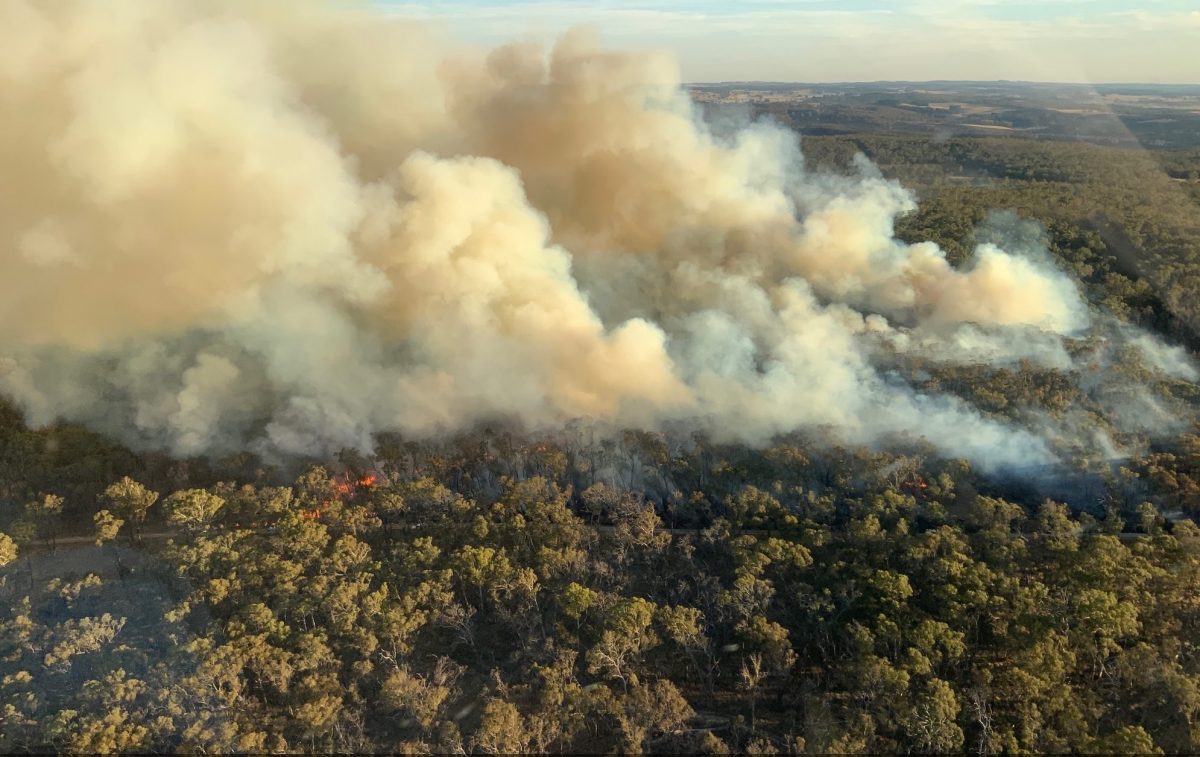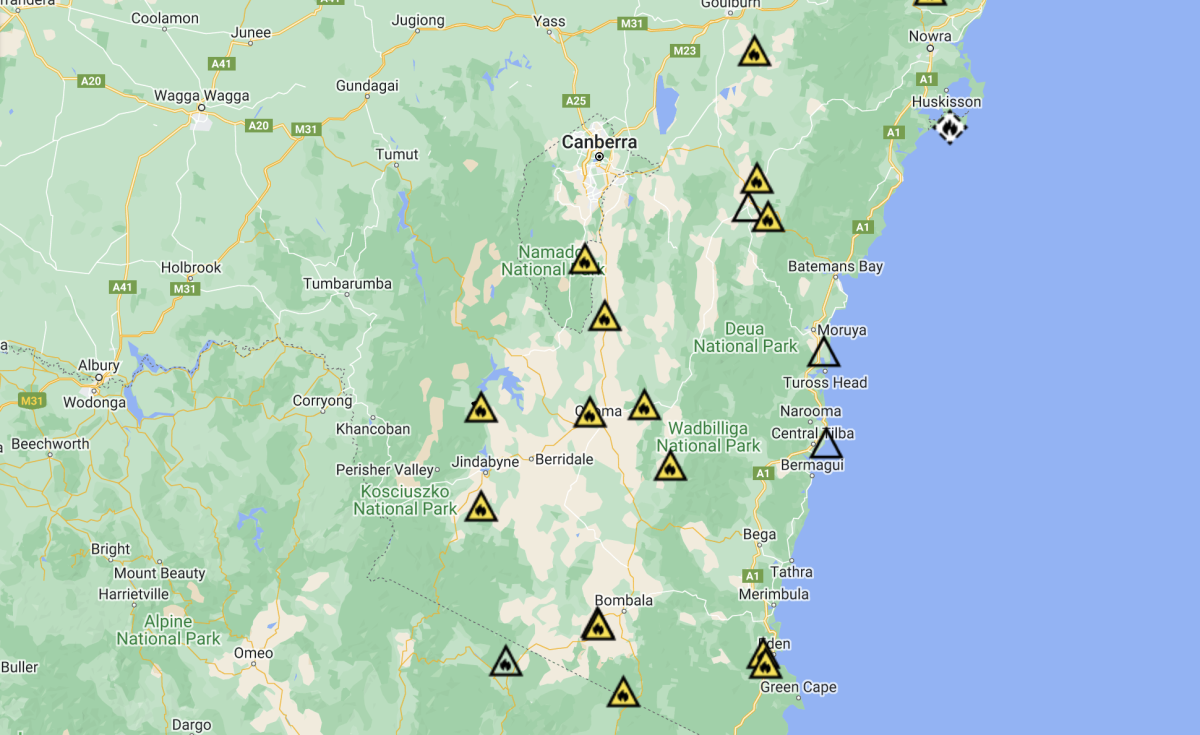
Looking after yourself begins with acknowledging what’s triggering you – whether it’s the smell of smoke, the sound of helicopters, or other cues that take you back to the bushfires. Photo: NSW RFS.
After a worryingly dry year, much needed rain arrived to green up our summer and allow us to relax a bit.
The drying landscape, early fires around Bermagui, and now further north, can trigger emotional and physical responses in many who have lived through previous bushfire events.
Smoke, sirens, helicopters and emergency warnings can make our hearts pound and heads turn to the sky.
In a nauseating minute, we can be back refreshing apps and repeatedly checking news and social pages. And then there is the dreaded wind. If we close our eyes, the summer of 2019/20 is back in a flash.
In a strange irony, what triggers us – knowing what may happen – can also be a source of strength. Now wiser for our experiences, University of Canberra (UC) psychologist Professor Debra Rickwood says we can use these to our benefit and help to lessen the effects of the triggers.
“The signs of fires upset everybody in some way – we are all triggered a bit,” she says, adding some people may even be grappling with post-traumatic stress disorder (PTSD) and require professional help.
Amid the reminders, Professor Rickwood suggests arming ourselves with some psychological tools to combat the resurgence of anxiety and fear. “Think of it as having tools in the toolkit,” she says.
Dr Rickwood says looking after yourself begins with acknowledging what’s triggering you – whether it’s the smell of smoke, the sound of helicopters, or other cues that take you back to the bushfires. Identifying these triggers is crucial for implementing effective coping strategies.
“Name it – smelling smoke, hearing helicopters, whatever it is – identify your triggers then take steps to comfort, calm and distract yourself,” Professor Rickwood advises.
For guidance and resources, she suggests turning to the Rural Fire Service (RFS) website.
“There are some excellent guides and resources there. Being informed can make a significant difference and help provide a sense of control amid chaos,” she says.
Having a plan in place to reduce anxiety, knowing what to do in the event of an emergency, is the first step towards control.
“Take steps to plan what you will do. Be aware of precious things if you need to evacuate,” she advises.
Next, take steps to calm yourself, “be present in the moment [and] takes steps to distract your mind away from your fears”.

Dr Rickwood suggests strategies like limiting doom-scrolling and refraining from excessive news consumption. Photo: NSW RFS.
The UC Professor recommends using physical actions to interrupt the mental spiral. This involves practising mindfulness techniques such as focused breathing, washing your face, or holding an ice cube.
“These actions may seem simple, but they serve to ground you, bringing your physical self into the moment, and out of flight mode,” she says.
Repeated use of a comfort item, like a squishy ball, can also play a pivotal role in achieving a state of calm.
“Bring the mind’s attention back to reality,” she adds.
While emphasising the need for connection and support during these challenging times, Professor Debra also acknowledges the dark side of hyper-vigilance and awareness, where excessive concern can lead to negative thought patterns.
“Connection needs to be constructive. Constantly flooding ourselves, keeping ourselves aroused, it’s like body system chaos and stress. It becomes addictive and it’s not good for your body,” Professor Debra warns.
It is crucial to stand down after a high alert, giving your body and mind a break from the perpetual state of stress.
“Prepare to react, but it’s not good for the mind; you need periods of calm to recover and restore,” she says.
Acknowledging the addictive nature of stress, Dr Rickwood suggests strategies like limiting doom-scrolling and refraining from excessive news consumption.
“It’s a drama – don’t get involved, keep out of the concerns of others. Limit talk about threats,” she advises, promoting a balance between staying informed and protecting your mental wellbeing.
For those able to find comfort in mindfulness, Professor Debra suggests practices such as meditation, breathwork, and rehearsing coping strategies.
“Living in the moment can be tough but is a powerful tool for managing trauma,” she says.
Redirecting your thoughts away from anxiety-provoking scenarios is another recommended strategy.
“Not thinking about future what-ifs. Do everything you can to put it aside. Appreciate and focus on what is in front of you and not future fear,” she says.
“Ask yourself, what are you worried about happening again?
“Try to remember it is important to be prepared but you also need to live in the moment.”
Seeking professional help may be necessary, especially if sleep disturbances, strained relationships, obsessive thoughts, or panic attacks persist.
“Mindfulness strategies work well for many people but in some cases there may be a time when you really need to seek professional help,” she says.
If you or someone you know needs support, you can contact:
- Lifeline’s 24-hour crisis support line – 13 11 14
- Suicide Call Back Service – 1300 659 467
- Kids Helpline – 1800 551 800 or kidshelpline.com.au
- MensLine Australia – 1300 789 978 or mensline.org.au








